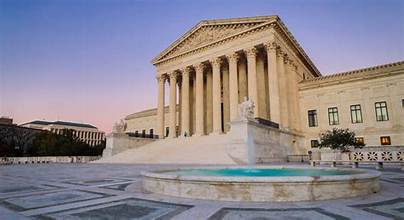Supreme Court rules ex-presidents have broad immunity, dimming chance of a pre-election Trump trial
WASHINGTON (AP) — The Supreme Court on Monday ruled for the first time that former presidents have broad immunity from prosecution, extending the delay in the Washington criminal case against Donald Trump on charges he plotted to overturn his 2020 presidential election loss and all but ending prospects the former president could be tried before the November election.
In a historic 6-3 ruling, the court’s conservative majority, including the three justices appointed by Trump, narrowed the case against him and returned it to the trial court to determine what is left of special counsel Jack Smith’s indictment.
Trump celebrated a “BIG WIN” on X. President Joe Biden said the justices set “a dangerous precedent (that) undermines the rule of this nation.
”The ruling reflected a muscular view of presidential power, and left dissenting judges to criticize it as undermining a core democratic principle that no person is above the law.
The court’s decision highlighted how the justices have been thrust into an impactful role in the November presidential election. Earlier, they had rejected efforts to bar him from the ballot because of his actions following the 2020 election. The court last week also limited an obstruction charge faced by Trump and used against hundreds of his supporters who stormed the Capitol on Jan. 6, 2021. The split among the justices also in many ways mirrored the political divide in the country.
“Under our constitutional structure of separated powers, the nature of presidential power entitles a former president to absolute immunity from criminal prosecution for actions within his conclusive and preclusive constitutional authority,” Chief Justice John Roberts wrote for the court. “And he is entitled to at least presumptive immunity from prosecution for all his official acts. There is no immunity for unofficial acts.”
from prosecution for all his official acts. There is no immunity for unofficial acts.”
The chief justice insisted that the president “is not above the law.” But in a fiery dissent for the court’s three liberals, Justice Sonia Sotomayor wrote, “In every use of official power, the President is now a king above the law.”
Reading from her opinion in the courtroom, Sotomayor said, “Because our Constitution does not shield a former president from answering for criminal and treasonous acts, I dissent.” Sotomayor said the decision “makes a mockery of the principle, foundational to our Constitution and system of government, that no man is above the law.”
The protection afforded presidents by the court, she said, “is just as bad as it sounds, and it is baseless.”
Trump posted in all capital letters on his social media network shortly after the decision was released: “BIG WIN FOR OUR CONSTITUTION AND DEMOCRACY. PROUD TO BE AN AMERICAN!”
Biden, in evening remarks from the White House, cited accepted restraints on presidential power all the way back to George Washington and bemoaned that “for all practical purposes, today’s decision almost certainly means that there are virtually no limits on what a president can do.”
Smith’s office declined to comment on the ruling.
Senate Majority Leader Chuck Schumer denounced the ruling as “a disgraceful decision,” made with the help of the three justices that Trump appointed.
“It undermines SCOTUS’s credibility and suggests political influence trumps all in our courts today,” the New York Democrat said on X.
The justices knocked out one aspect of the indictment. The opinion found Trump is “absolutely immune” from prosecution for alleged conduct involving discussions with the Justice Department.
Trump is also “at least presumptively immune” from allegations that he tried to pressure Vice President Mike Pence to reject certification of Democrat Joe Biden’s electoral vote win on Jan. 6, 2021. Prosecutors can try to make the case that Trump’s pressure on Pence still can be part of the case against him, Roberts wrote.
The court directed a fact-finding analysis on one of the more striking allegations in the indictment — that Trump participated in a scheme to enlist fake electors in battleground states won by Biden who would falsely assert that Trump had won. Both sides had dramatically different interpretations as to whether that effort could be construed as official, and the conservative justices said determining which side is correct would require additional analysis at the trial court level.



